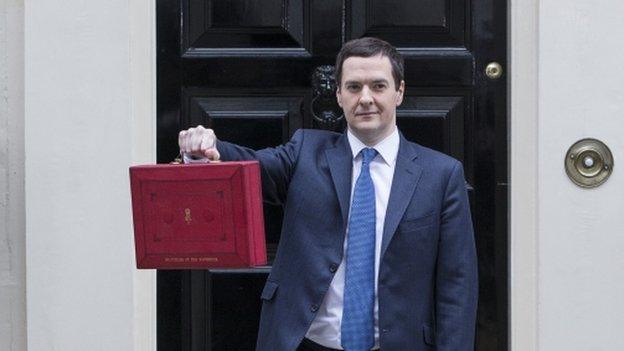Will this be history's dullest budget?
- Published
- comments

I don't want to set your pulse racing but the budget on 18 March looks set to break records - as perhaps the least eventful and dullest in history.
Which of course does not mean it will be one of the worst, in that history teaches us that budgets that do the biggest things often turn out to be those that chancellors live to regret.
But on this occasion, the absence of any spectacular newsworthy tax reforms or public spending changes will stem from two structural impediments.
First, and most important, the Lib Dem wing of the coalition feels a pre-election need to assert its political and fiscal independence.
Or to put it another way, the Lib Dems do not wish George Osborne as chancellor to have a glory day so close to 7 May: if he makes a big noise, they fear their voices will be drowned out.
So their declaration of independence is to make sure the budget is a do-very-little event.
I am reliably told by both senor Tories and senor Lib Dems that there will not be any new tax or spending initiatives that are outside of the sort of thing the government has been doing since it was formed in 2010.
For example the tax-free income-tax allowance may be pushed up yet again from the £10,600 already announced for 2015/16 - since this a policy that Lib Dems say they invented, and the Tories think voters associate with them.
And presumably there will be more help for small businesses, in that all politicians over every shade and persuasion love to claim they are helping small businesses.
But, I am told, there is no prospect of anything on the scale or ambition of the pension reform we saw in November's Autumn Statement, which allowed pension savers much greater freedom to use their accumulated savings as they please.
Apart from anything else, even if the Tories and Lib Dems did belatedly agree on some great fiscal initiative - and I am told they were a million miles from that at yesterday's meeting of the quad of prime minister, deputy prime minister, chancellor and Treasury chief secretary - the fixed election timetable means there is no time for a proper finance bill.
In other words, this will be a budget filled with measures that are likely to get cross party support, which means they will probably be practical, sensible and deeply unsexy.
There has already been massive trailing, for example, of cuts in North Sea tax, to compensate oil companies for the deep fall in the oil price and to try to stem a collapse in investment in the region.
And if there aren't further attempts to crack down on tax avoidance, I will eat the slimmer-than-usual budget book.
Also at the end of a parliament when the national debt has increased more than 10 percentage points of GDP or national income more than the government hoped when it took office, there will be plenty of interest in the Office for Budget Responsibility's latest forecasts - which may well show a marginally better outlook for the public finances than it predicted three months ago.
But any modest improvement in the profile of deficit reduction over the coming five years won't change the fundamental story, of the Tories being wedded to significantly deeper spending cuts than Labour, to secure a faster reduction in national debt as a share of GDP.
Nor do I expect George Osborne to be especially boring. He is bound to use his moment in the spotlight to announce some biggish things the Tories might do if elected in May.
But with the outcome of the election highly uncertain, these will be interesting but deeply conditional policies.
As for the idea that there will be some last minute change of heart by Tories and Lib Dems, such that they attempt to bribe us with some big giveaway, well, stranger things have happened I suppose. But it would be a pretty bizarre act for a chancellor who presumably greets his wife and children every morning by reminding them that he has a "long term economic plan".